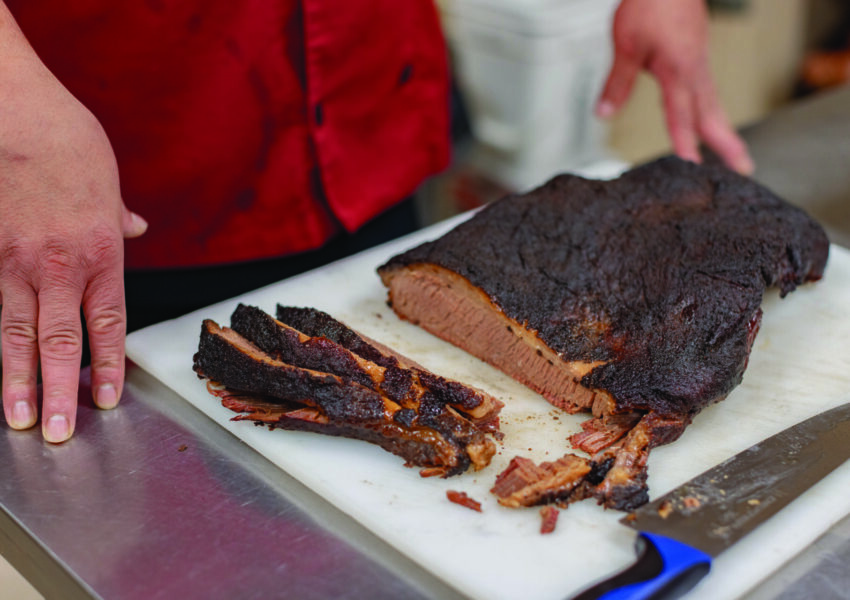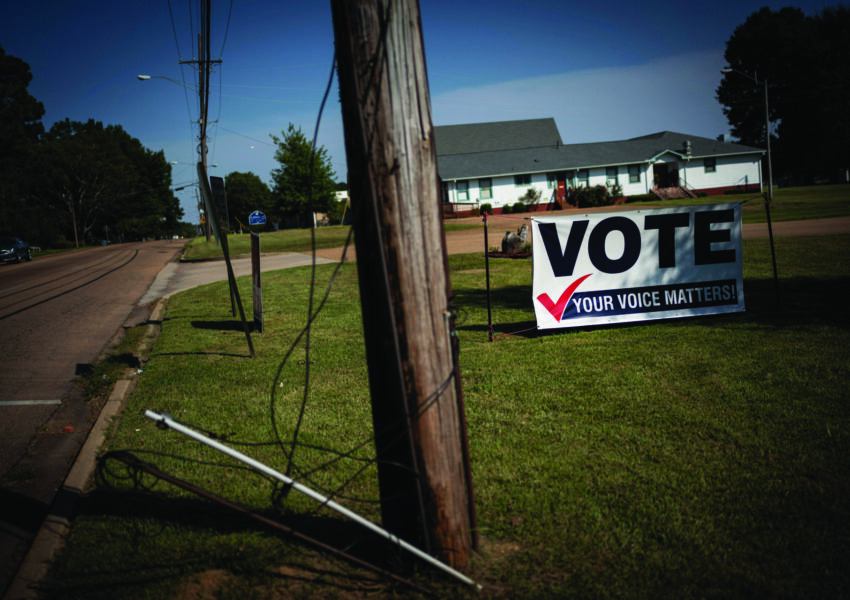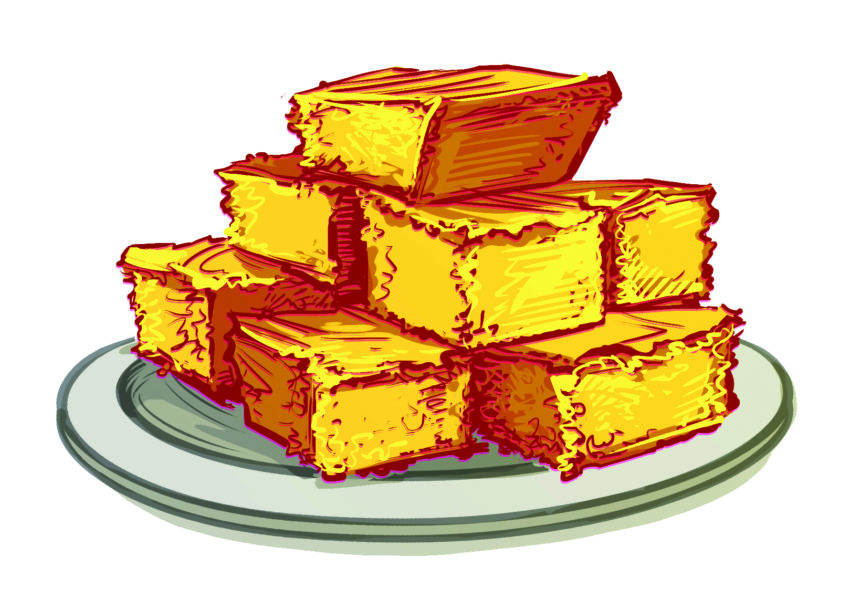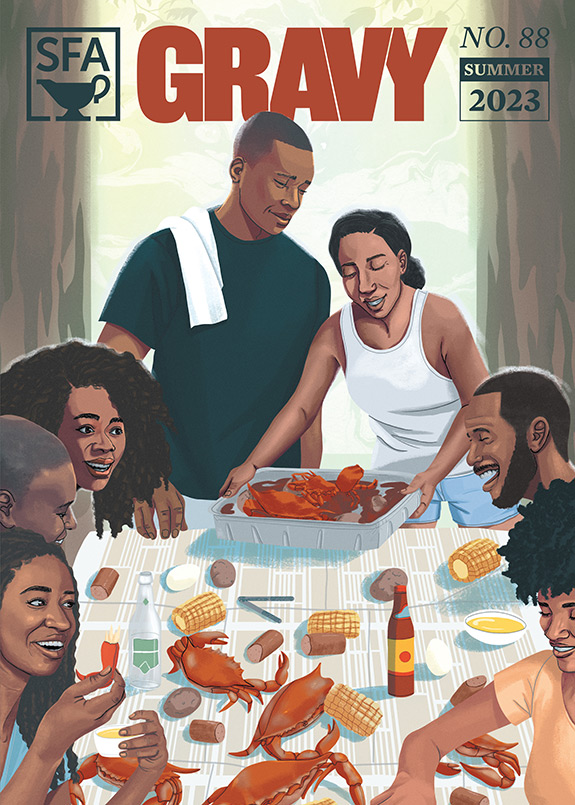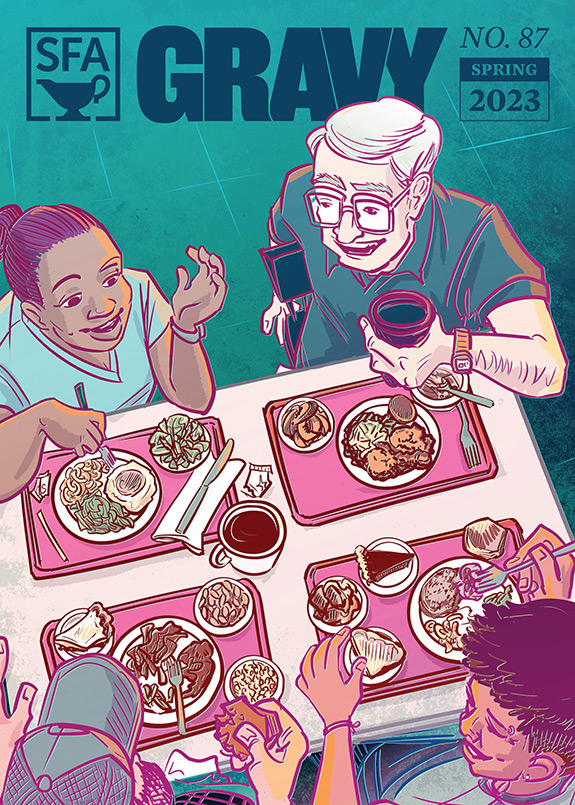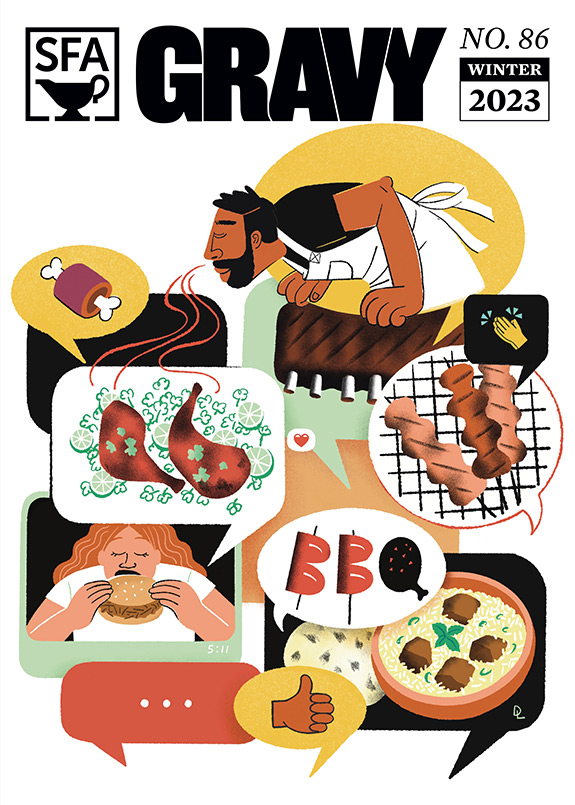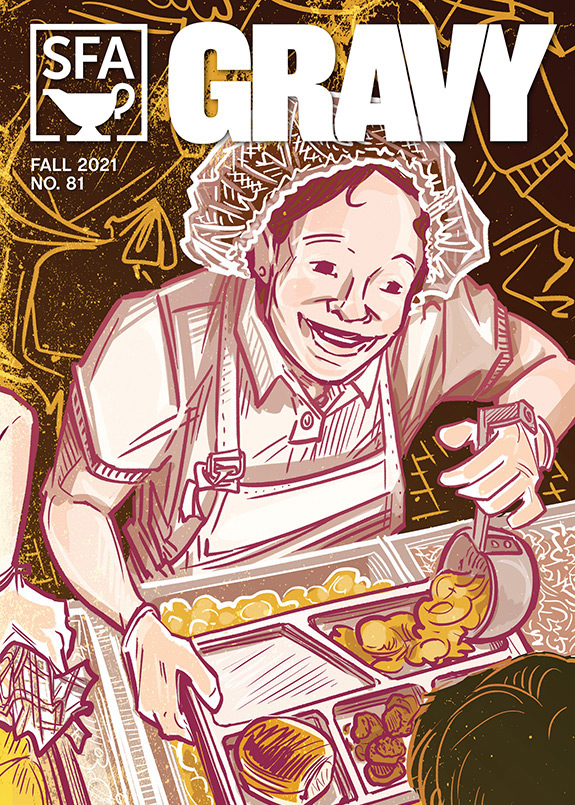This article originally appeared in Gravy #50.
Christmas in Auburn
by Blair Hobbs
MY BROTHER MIT TELLS ME that in August of 1963, when Dr. McLarty called Mama to tell her she was pregnant, she dropped the rotary phone receiver and cried so hard into her apron skirt that my other siblings assumed that she had heard news of cancer. I can’t say that I blame her. My brothers and sister were well on their way to being grown, and Mama had gotten back to her own life by taking up smoking and pursuing a master of fine arts degree at the University of Mississippi. “Well, piffle,” I can hear her say, “boiling milk bottles and ironing diapers is my future, again.”
Eventually, Mama’s despair turned into determination. She finished her degree when I was a toddler and her older children were settled into school routines. In 1967, when I was three, she and Daddy moved to Auburn, Alabama, where Daddy became dean of Arts and Sciences, and Mama was hired as an art professor. Throughout my childhood, Mama and Daddy both worked, and my common interaction with them was at mealtimes and Sunday church. For the rest of my childhood, they pretty much went their own way and, with a hired maid, I went mine.
By 1970, my parents had established a reputation for hosting an academic Christmas party to which even Jewish and Hindu faculty members looked forward. The party was a gift, a way for Daddy to thank his colleagues for a year of good work. Mama enjoyed hosting her art colleagues, who added a dash of weird to the earnest historians and political scientists. And I relished my annual step into the world of happy grownups.
The guest list was always repeated unless there was a new hire in Daddy’s department or someone in the art department wasn’t granted tenure and therefore quit believing in Christmas. Daddy was accustomed to the quirks of academics, so his people had to pull some pretty horrible behavior to get cut from the party list.
One Thanksgiving, a Russian professor who received a less-than-stellar academic review attempted revenge upon Daddy by unloading a pillowcased king snake into our curbside mailbox. We watched from the kitchen window as the disobedient snake flailed out of the mailbox’s mouth and terrified the man—who believed the snake was poisonous—into leaps worthy of a Bolshoi ballerina. Daddy turned to my mother and instructed, “Marley, please cross Dr. Petrovsky off the list.”
During party prep time, Mama, Daddy, and I worked together. We’d set up a fat Douglas fir from the Glendean drugstore parking lot and wrap it with colored light strands and ornaments. Daddy hung the bundled plastic mistletoe in the foyer, and mama draped the split-level stairwell with a garland of fake boxwood and fruits. I placed electric candles in the windows of our split-level ranch.
When the big day arrived, Mama, Daddy, and I were a melange of tinseled anticipation. The doorbell rang, Mama greeted guests, and I ferried coats and pocketbooks to my bedroom. Mrs. Campbell’s mink always smelled of cigarettes and Windsong perfume, and Mrs. Cooper, a dead-ringer for Edith Head, carried a brass cricket box instead of a real clutch. Every year, as Dr. Mohan slid Mrs. Mohan’s wool coat off of her shoulders, I feared that her peacock sari would catch a button and unspool from her sugarplum frame.
After the guests settled, it was my job to check on Daddy, who stood at the breakfast room table and ladled bourbon punch from his grandfather’s porcelain foot-washing bowl. When the cheer diminished, I knew it was time to pour in a gallon of ginger ale, a can of pineapple juice, a pitcher of orange juice from concentrate, and a gallon of Old Grand-dad. Then I opened the freezer and grabbed an ice ring, wreathed in sliced lemons and oranges, and slid it into the murky concoction with barely a splash.
Navigating the living room to get to the food table was daunting. Men in red vests or cranberry leisure suits stood shoulder-to-shoulder, and while they downed punch, I waded beneath their elbows. The women, in crushed velvet miniskirts or silk bell-bottoms, lifted their chins to exhale smoke from their frosted smiles. Many times these happy folks paused their grown-up conversations to speak to me.
“Blair, you’re such a little lady!” Dr. Littleton would say.
“Blair, you look so pretty in your mother’s pearls!” Mrs. White would declare.
And, upon noticing that the plastic boxwood garland was close to melting on the fireplace mantle, I’d excuse myself to open the casement windows and sliding glass door to let in the cool December air.
The dining-room table was a glory to behold. Polished silver candelabras held slender red candles lit with fingernail flames. In the table’s center were shallow bowls of Pink Perfection camellias clipped from the backyard bushes. At the head of the table was an enormous silver tray overlapped with pickled mushrooms and sliced beef. Silver chafing dishes, mounted on scrolled parenthetical legs, held hot crab, artichoke, and spinach dips. Across the table, there were pewter baskets of Wheat Thins and Triscuits, homemade sugar cookies in the shapes of wreaths and Christmas trees, buttery cheese straws, and Bisquick-inspired hot sausage balls. At the far end of the table, a crystal bowl filled with pink shrimp and hulahoops of onion slices cast a chandelier prism.
After our guests left and the Perry Como record, set to repeat, finally became audible, Mama, Daddy, and I hunted down clean plates and cocktail napkins so that we could enjoy the remains of the feast. Mama kicked off her pumps and poured a glass of white wine from the brown Lancer’s bottle. I found the untouched cookie platter and rung my fingers with the sugary wreaths, nibbling them down to my knuckles. As the cigarette smoke cleared, Daddy, with a toothpicked shrimp in his hand, would salute my rosy-cheeked mother and me and declare, “Another great party, ladies.”
Blair Hobbs is a poet and artist who teaches creative writing at the University of Mississippi.


